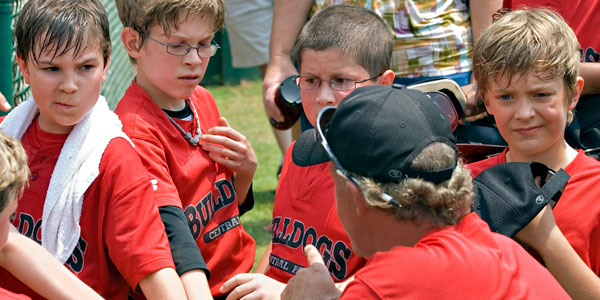Help Athletes Welcome Friendly Competition
Young athletes can reap many benefits from embracing friendly competition.
Often, kids shy away from competing with their teammates. They feel as if they’re not as talented as their teammates or are afraid of being embarrassed in front of them.
For example, a basketball player with a cautious mindset may not want to guard a top scorer during drills because she is worried about being judged negatively.
She fears being faked out and looking foolish. Instead of playing aggressively, she plays cautiously. She’s tight and flat-footed. As a result, she gives up several easy drives to the basket.
Kids with cautious mindsets see friendly competition as an opportunity to fail in front of the entire team.
On the other hand, players with competitive mindsets view guarding a top offensive teammate as an opportunity to show off their skills. If these players are beaten off the dribble, they learn from their mistakes and feel better prepared for the next drill.
Here’s a second example. Two midfielders on the same soccer team are fighting for playing time. One player has a competitive mindset and takes calculated risks on the field.
In scrimmages, he tries to push the ball downfield or make the occasional difficult pass. Meanwhile, the soccer player with a cautious mindset plays cautiously and tries not to make mistakes.
Successful teams often encourage friendly competition, which builds team cohesion. When kids compete against their teammates, not only do they improve: everyone around them improves.
The United States Women’s National Team (USWNT) has been one of the top soccer teams in the world for more than a decade. Midfielder Rose Lavelle attributes the team’s success to the culture of friendly competition.
“Hopefully we’ll be seeing new faces in camp because I think it’s always good to bring in some players who can push everyone here and push for spots. That’s what’s made this team so great and successful,” says Lavelle.
Becky Sauerbrunn, former captain of the USWNT, defines friendly competition as the balance between accepting teammates and competing against them in practice.
“It’s like, ‘Welcome, we’re here for you if you need anything. But when we get on the field, I’m gonna do my best to basically not allow you to have a good day,’” she says.
Friendly competition serves two primary purposes. First, competing against teammates lifts all team members to a higher performance level, and second, it prevents complacency.
Help your sports kids welcome friendly competition. This type of competition is not designed to make kids look or feel bad. The goal of friendly competition is to motivate young athletes to work hard and improve their game.
As kids improve their game, they become better assets to their teams. They also are better able to push their teammates even further.
Kids should look forward to practice and training, but just as important, they should look forward to challenging their teammates to work harder and smarter.
Related Articles on Youth Sports:
- When Athletes Worry About Being Judged
- When Athletes Worry About What Friends Think
- When Your Sports Kid’s Confidence is Low Because Friends Excel
*Subscribe to The Sports Psychology Podcast on iTunes
*Subscribe to The Sports Psychology Podcast on Spotify
The Composed Sports Kid

“The Composed Sports Kid” audio and workbook digital download program for young athletes and their parents or coach helps kids cope with frustration and anger in sports. Help your sports kids learn how to manage expectations and let go of mistakes so they can keep their head in the game.
The Composed Sports Kid system is really two programs in one–one program to train parents and coaches how to help their kids practice composure, and one program that teaches young athletes–ages 6 to 13–how to improve composure, let go of mistakes quickly, have more self-acceptance, and thus enjoy sports more!

